2019 山东省威海市中考英语真题及答案
一、阅读理解(共五篇短文, 共 25 小题, 计 30 分。其中 1-20 每小题 1 分; 21-25 每小题 2
分。)阅读 A、B 篇, 从文后每小题 A、B、C 选项中选择最佳答案。请将答案编号涂卡。
A
Mr Chen was puzzled(闲惑的)and a little suspicious(怀疑的). He sat in the
office and studied a letter apparently(看似)from Mrs Wang, the mother of one of
the pupils in his class. There was something about it which worried him.
“I
don't
understand, ”he
said
to
himself. He shook his head as
he circled four mistakes in
the letter. "Mrs Wang is an
educated woman. She wouldn't
make mistakes like these even
if she did write the letter in
a hurry. "Mr Chen took out his
class register(名册)and said
to himself, “Yesterday was Thursday. Let me see. Ah, yes. I thought so. David was
absent on Thursday last week and the week before. Hm. Why is he so often absent on
Thursdays? Was he really ill yesterday? Could it be a coincidence(巧合)?”
Mr Chen stared at the register as if the answers to his questions were hidden
in it somewhere. Then he took out a copy of the timetable(课程表)for his class.
"I wonder. . "he told to himself. "I wonder if his absence has anything to do
with one of these lessons. "
Mr Chen looked at the subjects for Thursday: Mathematics, English, P. E. He
thought about P. E. He knew that the pupils had P. E. twice a weck: once on Monday,
when they usually played games on the school field, and once on Thursday, when they
did exercises in the gym.
Mr Chen glanced round the office to find Mr Long, the rather strict P. E. teacher,
�
but he was not there.
"I'd better have a chat with Long and David, "Mr Chen thought.
The bell rang. "I can't do anything right now, "Mr Chen thought. "It's time to
go to Class 2. I' ll do it later on. "
Mr Chen picked up his books and walked off to teach Class 2.
Later, on Friday, Mr Chen spoke to Mr Long, the P. E. teacher. Mr Long agreed
that it seemed strange for David to be absent so often on gym days. They thought
about it for a while.
“David is a good athlete(运动员), ”Mr Long finally said, "but he's afraid
of heights. I was hard on him once because he wouldn't climb more than a couple of
metres up the rope. Do you think that's why he's been absent recently? ”
“Yes, I think so, "Mr Chen said. "I'm going to talk to him this afternoon before
he goes home. "
"Well, I've got a suggestion to make, "said Mr Long. "If he's scared of heights,
he'd better come and see me after school. Quite a few people suffer from(遭受)
vertigo. I'll be glad to help him. ”
“That's very kind of you, "said Mr Chen. "I'll get him to come and see you on
Monday or Tuesday. ”
1. The letter was sent to Mr Chen because David
on Thursday.
A. was llat home
B. didn't go to school
C. was absent from P. E. class
2. Mr Chen was puzzled by the letter because
.
A. David's mother sent him the letter
B. he couldn't understand the letter
C. it didn't seem to be written by an educated adult
3. Mr Chen got the idea that David's absence had something to do with P. E. after
he
.
A. studied the timetable
B. studied the class register
�
C. talked with Mr Long
4. The underlined word“ vertigo" means in the passage.
A. 身体疼痛
B. 恐高眩晕
C. 肠胃痉挛
5. From the passage we know.
A. David didn't like P. E. classes
B. David didn't like Mr Long's being hard on him
C. David was afraid of heights
B
We know people can be nice, but what about animals?
Scientists say that some animals are capable(有能力的)of being nice. Animals
that live in groups-like foxes, chimpanzees(大猩猩), and elephants-follow rules.
They have to follow rules to get along and to survive(生存). However, animals can
act nicely, even when they don't have to. Here are some surprising stories about
animal behavior.
Most people usually walk away when someone is unkind to them. Marc Bekoff, a
researcher at the University of Colorado, saw a female(母的)red fox do just that.
The female fox was unhappy because a male(公的)fox played roughly(粗鲁地)with
her. When she walked away, the male fox showed her that he wanted to play nicely.
He lowered his head and rolled on his back. The female fox gave him another chance,
and this time, he played more gently.
Geza Teleki is a scientist who studies chimpanzees in Tanzania. One day, Teleki
hiked far away from his campsite. He didn't have any food. Teleki wanted some fruit
from a tree, but the tree was too tall. A young chimpanzee watched him curiously
as he tried to get something to eat. The chimpanzee climbed the tree, picked the
fruit, and gave it to him!
An elephant in Kenya hurt his trunk(象鼻子). He needed help because he couldn't
put food into his mouth. Researcher Kayhan Ostovar watched silently. He saw the hurt
elephant show his sore trunk to a healthy elephant. The healthy elephant didn't need
any more information. He took a bush and put it carefully into his new friend's mouth.
Hippos(河马)and crocodiles are usually good friends. They hang out together
�
in rivers. But Karen Paolillo, a wildlife expert in Zimbabwe, saw something
surprising. One day, a crocodile tried to eat a monkey that was next to a river.
A hippo ran quickly to the crocodile and chased it away. Why did the hippo attack
(攻击)the crocodile? Paolillo says hippos sometimes protect other animals from
crocodiles.
6. The main idea of the passage is
.
A. animals that live in groups follow rules
B. some animals can be nice to other animals
C. most animals are nice to people
7. The underlined phrase “do just that” means
.
A. be nice
B. play roughly
C. walk away
8. We can say that Teleki
.
A. is short
B. hates hiking
C. could not climb the tree
9. The elephant needed help because.
A. the tree was too tall B. it could not use its trunk C. it had no food
10. The underlined word “it” in the last paragraph refers to.
A. the crocodile
B. the chimpanzee
C. the monkey
阅读 C 篇, 判断正误。请将答案编号涂卡。
C
Misunderstandings
A man, wearing dirty clothes, with dirty hair and only 35 cents in his pocket,
got on a bus and headed straight for the restroom. He thought that if he hid in the
restroom, he could ride to New York without paying. But a passenger at the back of
the bus saw him. She tapped(拍)the person in front of her on the shoulder and said,
"There's a bum in the restroom. Tell the bus driver. ”That passenger tapped the
person siting in front of him. "Tell the bus driver there's a bum in the
restroom, ”he said.
The message was passed from person to person until it reached the front of the
bus. But somewhere along the way, the message changed. By the time it reached the
bus driver, it was not “There's a bum in the restroom” but “There's a bomb(炸
�
弹)in the restroom. ”The driver pulled over to the side of the highway(高速公
路)at once and called the police. When the police arrived, they told the passengers
to get off the bus and stay far away. Then they closed the highway. That soon caused
a 15-mile-long traffic jam. With the help of a dog, the police searched the bus for
two hours. Of course, they found no bomb.
Two similar-sounding English words also caused trouble for a man who wanted to
fly from Los Angeles to Oakland, California. His problems began at the airport in
Los Angeles. He thought he heard his flight announced, so he walked to the gate,
showed his ticket, and got on the plane. Twenty minutes after take-off, the man began
to worry. Oakland was north of Los Angeles, but the plane seemed to be heading west,
and when he looked out his window all he could see was ocean. "Is this plane going
to Oakland? ”he asked the flight attendant. "No, "she said. "We're going to
Auckland-Auckland, New Zealand. ”
Because so many English words sound similar, misunderstandings among
English-speaking people are not uncommon. Most misunderstandings are much less
serious. Every day, people speaking English ask one another questions like these:
"Did you say seventy or seventeen? ”“Did you say that you can come or that you
can't? ”
Similar-sounding words can be especially confusing(混淆)for people who speak
English as a second language. When a Korean woman who lives in the United States
arrived at work one morning, her boss asked her, "Did you get a plate? ”
“ No. . ,”she answered, wondering what in the world he meant. She worked in an
office. Why did the boss ask her about a plate? All day she wondered about her boss's
strange question, but she was too embarrassed to ask him about it. At five o'clock,
when she was getting ready to go home, her boss said, “Please be on time tomorrow.
You were 15 minutes late this morning. ""Sorry, "she said. "My car wouldn't start,
and. . ”
Suddenly she stopped talking and began to smile. Now she understood. Her boss
hadn't asked her,
“Did you get a plate? "He had asked her, “Did you get up late? ”
�
Auckland and Oakland. "A plate" and" up late". When similar-sounding words cause
a misunderstanding, probably the best thing to do is just to laugh and learn from
the mistake. Of course, sometimes it's hard to laugh. The man who traveled to Auckland
instead of Oakland didn't feel like laughing. But even that misunderstanding turned
out all right in the end. The airline paid for the man's hotel room and meals in
New Zealand and for his flight back to California. "Oh well, "the man later said.
“I always wanted to see New Zealand. "
A 表示正确, B 表示错误。
11. A man got on the bus and hid in the bus restroom with a bomb.
12. The 15-mile-long traffic jam was caused by the man in the restroom.
13. The man who traveled to New Zealand actually wanted to fly to California.
14. The boss of the Korean woman asked her if she had got a plate that day.
15. Misunderstandings happen sometimes because of the similar-sounding words.
D
阅读 D 篇, 根据短文内容, 将下面方框中的句子还原到文章当中, 使短文内容完整。请将答
案编号涂卡。
Time Management
Do you ever wish you had more time? Everyone gets the same amount of time each
day. But here are some ways to use those hours better. As a popular saying says,
“Work smarter, not harder. ”
The most important way to manage your time is to set priorities(优先权).
16
Also, consider whether or not they are urgent—if they need to be done right away.
It can be easy to forget important tasks that aren't urgent, so make time for them.
Decide ahead of time what you're going to do at certain times each day. Schedule
times not only to meet people but also to do things alone. Then you can make sure
everything gets done.
17
Are you smarter in the morning, afternoon or evening? Schedule difficult
tasks for times you feel good, saving easy ones for when you're tired.
Write down what you need to do and when. I keep two to-do lists: one for the
present tasks and one for larger projects I'm working on.
18
And I don't get
�
discouraged by looking at a long list of items I can't finish. I focus on the shorter
list of each day's tasks.
19
When someone wants to give you a task, think carefully. Is it really
important enough to spend your precious(宝贵的)time on? Could someone else do it
instead?
20
If you're in charge of running a meeting, keep it short. Reading articles
or talking to friends online can also use up much of your time. Don't allow it.
In the end, using time well is about making a good plan and sticking to it.
A. Think about the time of day you work best.
B. That way I can make sure I don't forget anything.
C. Figure out(弄明白)which of your tasks is the most important.
D. Often, managing time means saying no to things that aren't so important.
E. Meetings also tend to be a waste of time, so avoid them whenever possible.
E
研读 E 篇广告, 根据广告所提供的信息, 对后面的问题简要作答。请将答案填写到答题卡指
定位置。
�
Notes: draw 抽奖; entry form 报名表; receipt 收据; claim 认领
21. When is the last day to enter the "Lemonade Lucky Draw”?
22. Where will the draw for the car take place?
23. Which one is more possible to win, a free trip to Bangkok or a brand new car?
24. If you want to enter the Lucky Draw, what should you e-mail to whlukydraw@qq.
com?
25. How will the Lemonade T-shirts be dealt with if they aren't claimed by 30 July?
二、单词拼写(共 8 小题, 计 8 分)
根据句意和音标提示以适当形式填写单词, 请将答案填写在答题卡指定位置。
26. He works in an office in the
/'sentr: l/part of the city.
27. It gives me great
/plege(r)/to grow flowers.
28. Thank you for your
/'veljusbl/information.
29. She took the clothes out of the washing
/ma'fi:n/
30. The talented boy can play different kinds of: musical
/instrements/.
�
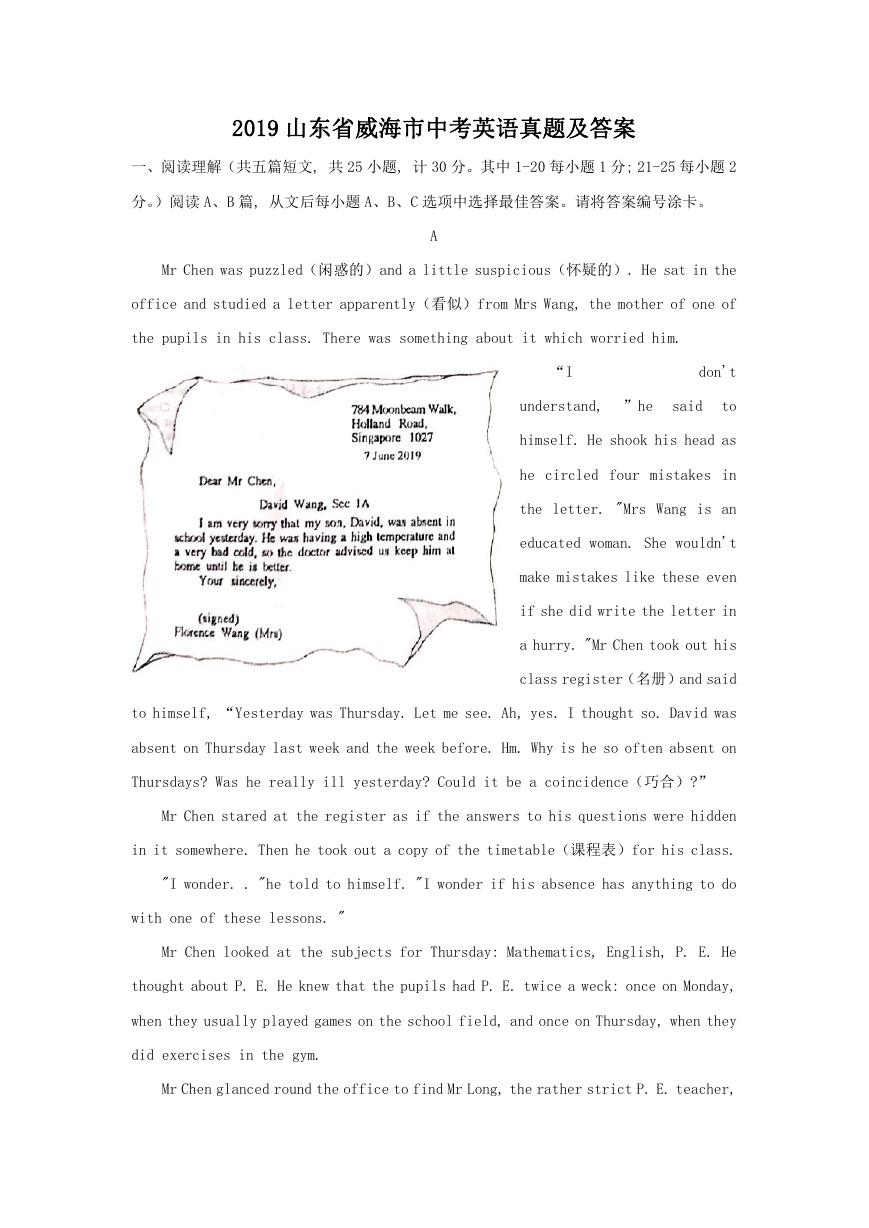
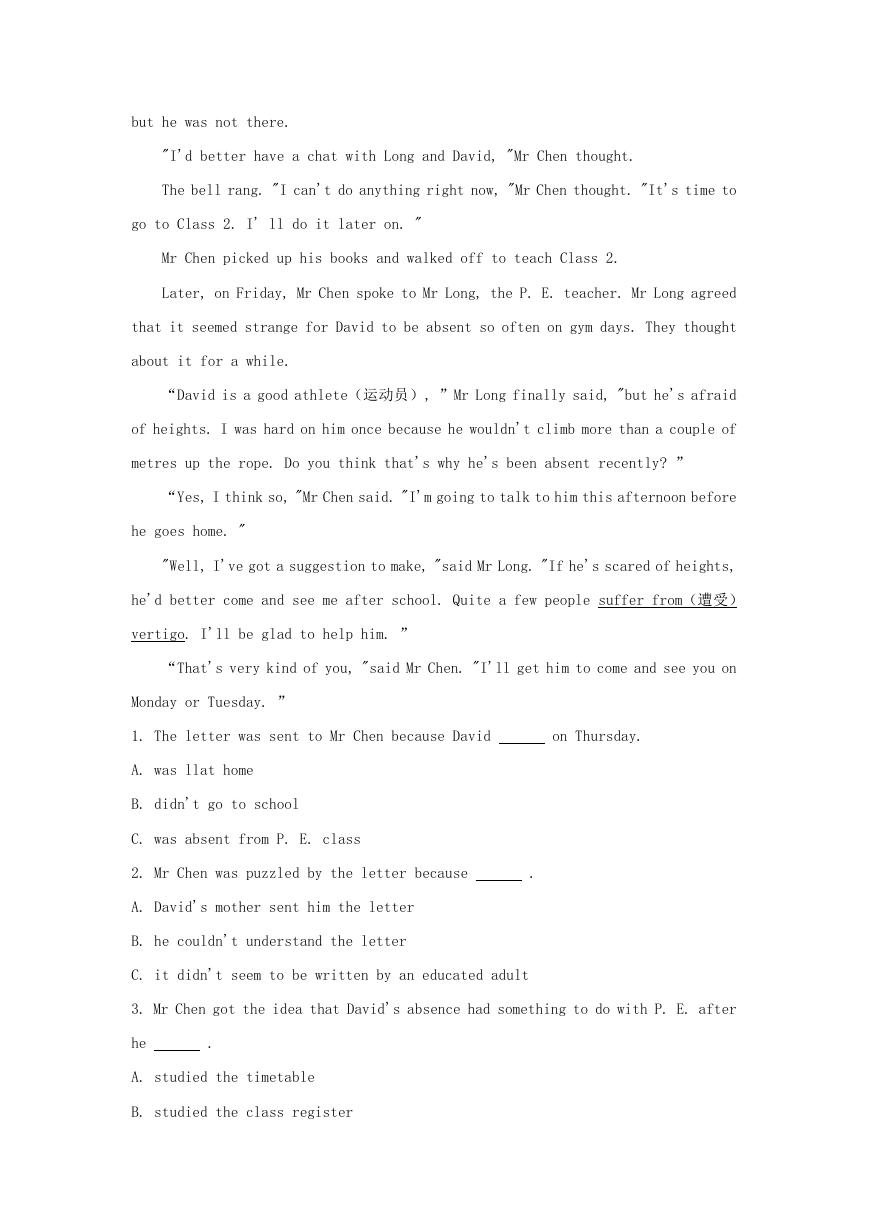
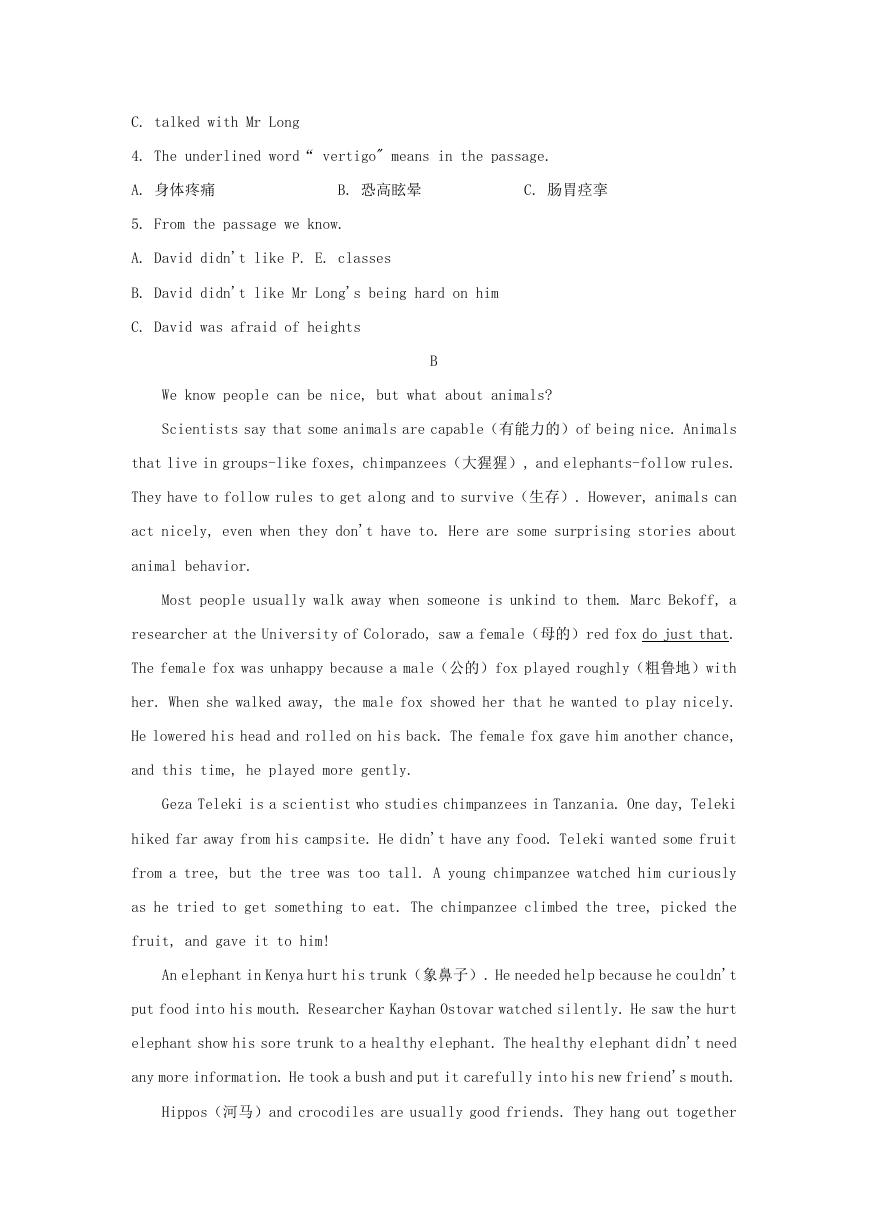

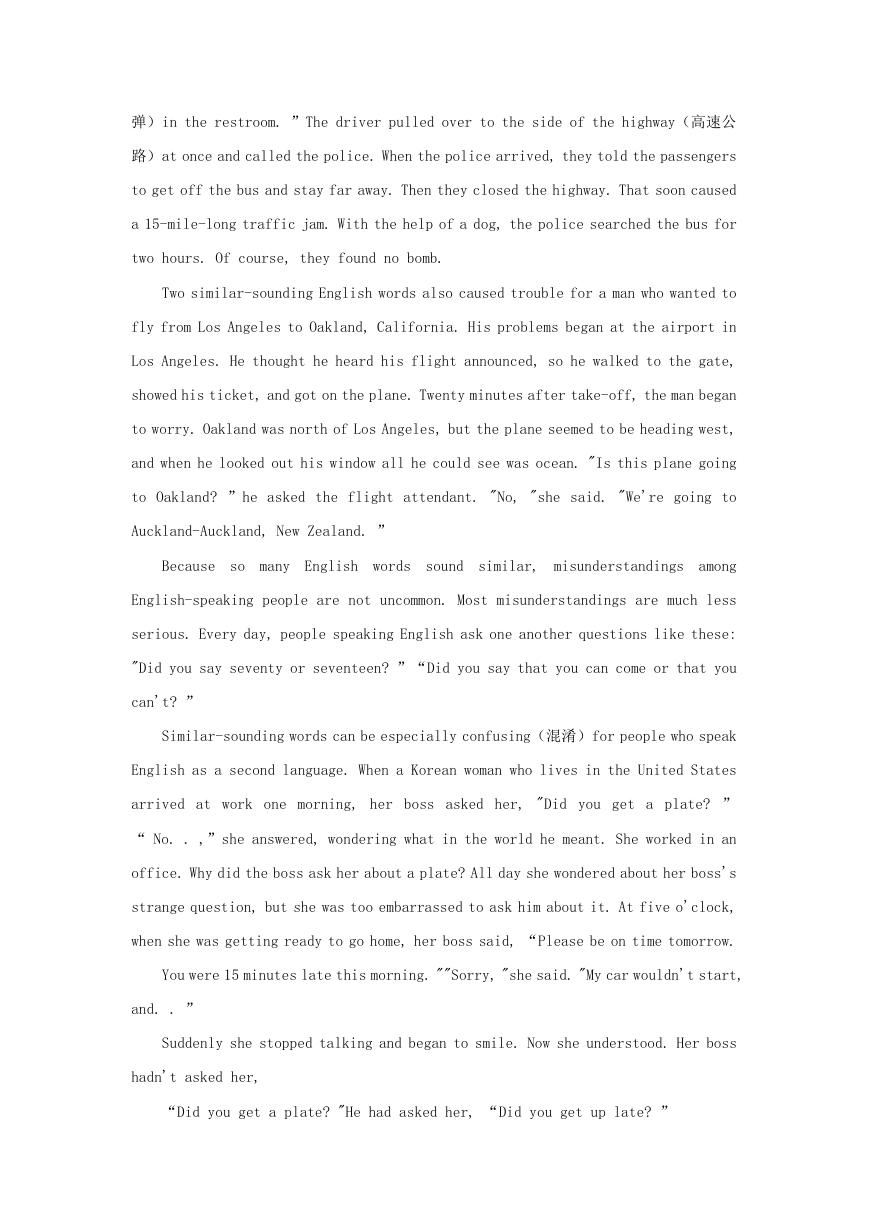
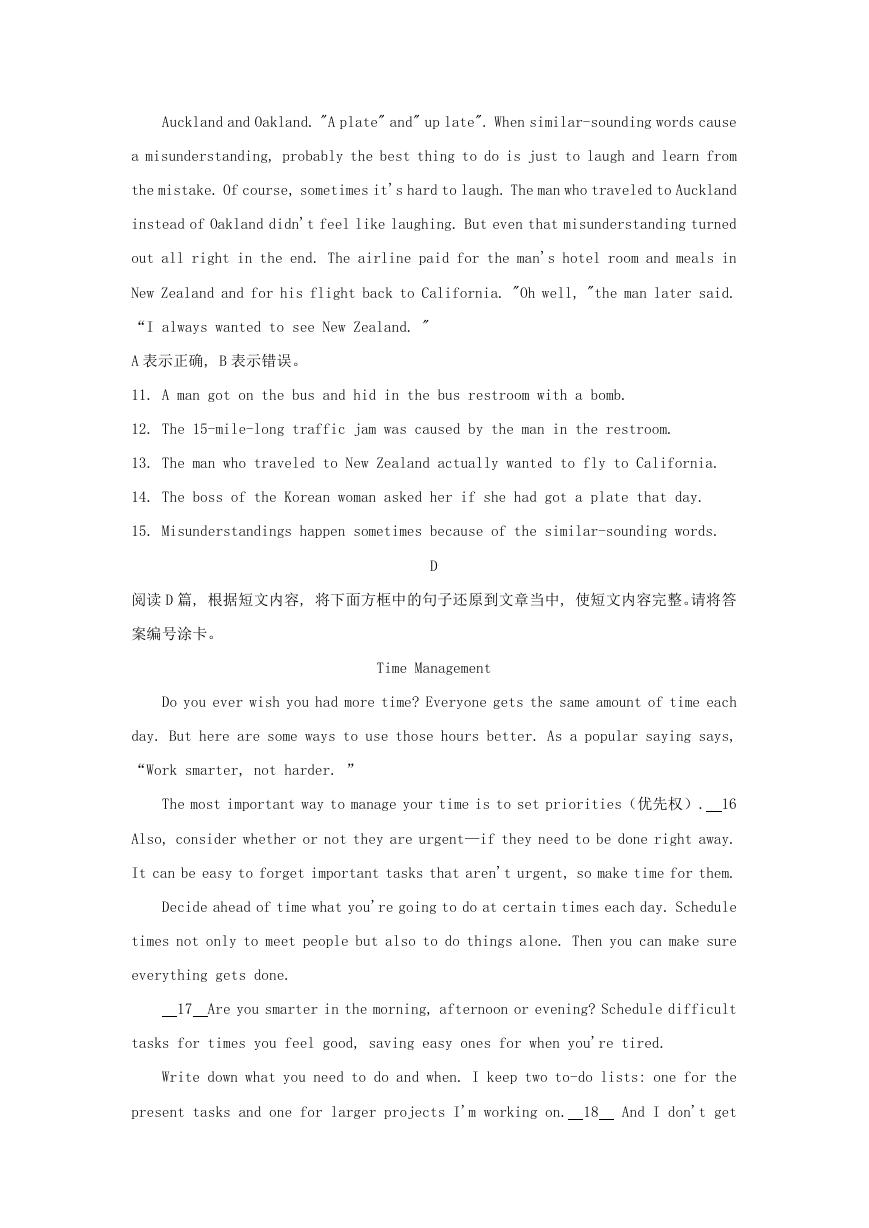
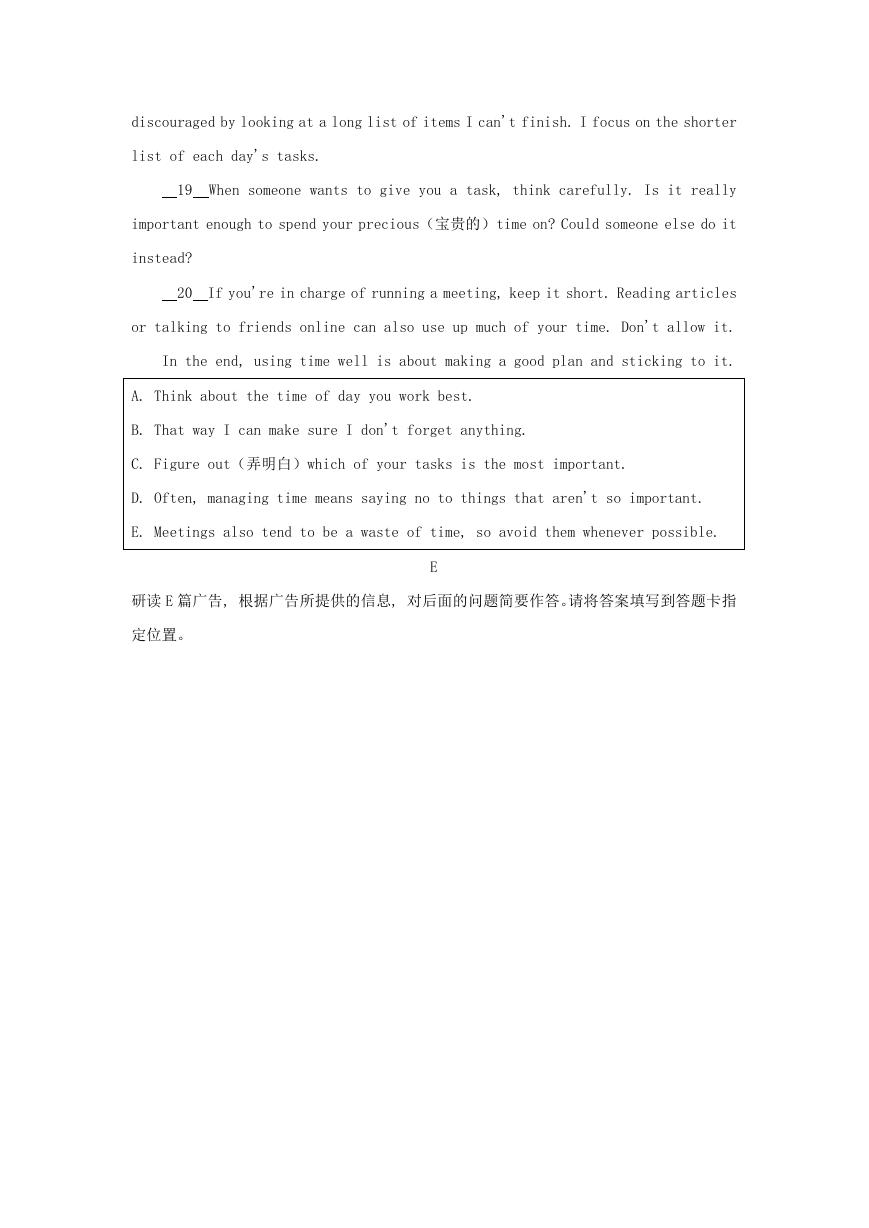
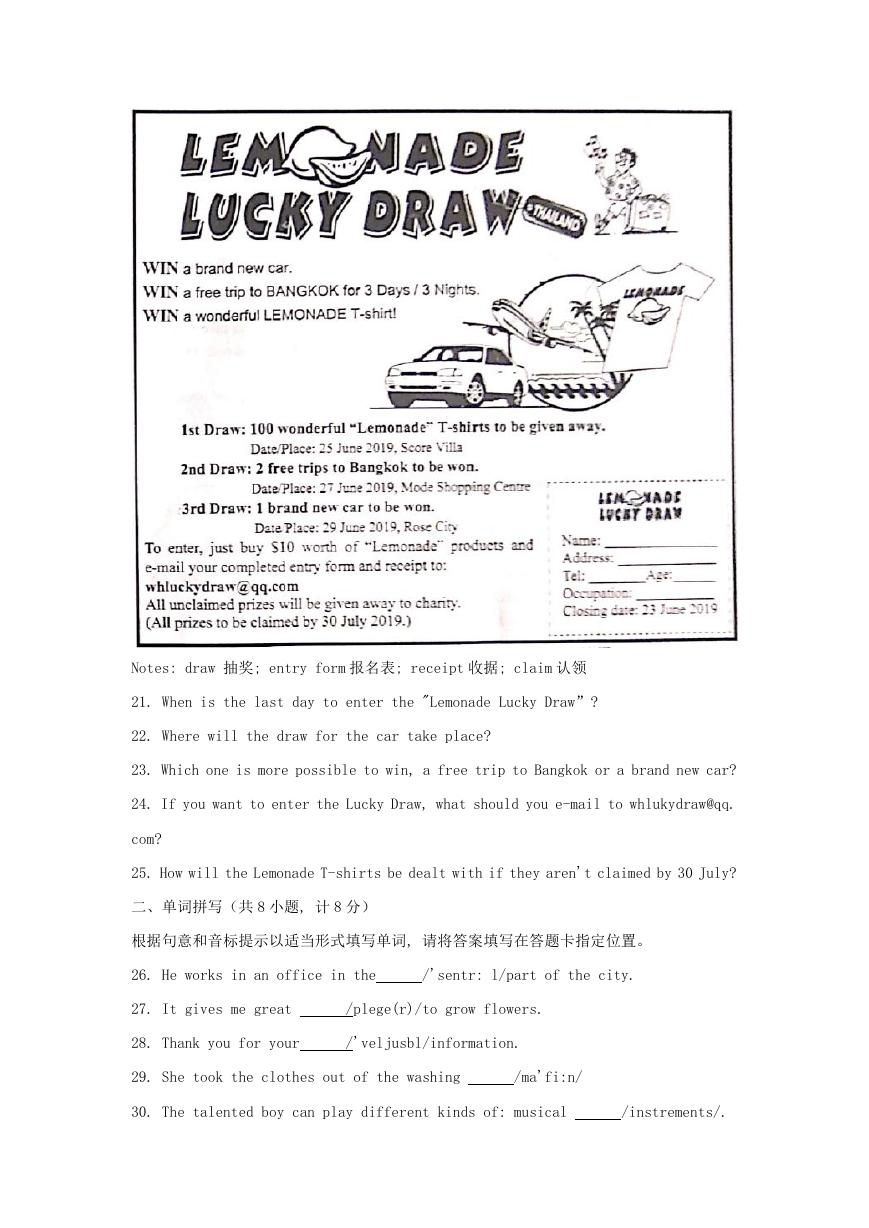








 2023年江西萍乡中考道德与法治真题及答案.doc
2023年江西萍乡中考道德与法治真题及答案.doc 2012年重庆南川中考生物真题及答案.doc
2012年重庆南川中考生物真题及答案.doc 2013年江西师范大学地理学综合及文艺理论基础考研真题.doc
2013年江西师范大学地理学综合及文艺理论基础考研真题.doc 2020年四川甘孜小升初语文真题及答案I卷.doc
2020年四川甘孜小升初语文真题及答案I卷.doc 2020年注册岩土工程师专业基础考试真题及答案.doc
2020年注册岩土工程师专业基础考试真题及答案.doc 2023-2024学年福建省厦门市九年级上学期数学月考试题及答案.doc
2023-2024学年福建省厦门市九年级上学期数学月考试题及答案.doc 2021-2022学年辽宁省沈阳市大东区九年级上学期语文期末试题及答案.doc
2021-2022学年辽宁省沈阳市大东区九年级上学期语文期末试题及答案.doc 2022-2023学年北京东城区初三第一学期物理期末试卷及答案.doc
2022-2023学年北京东城区初三第一学期物理期末试卷及答案.doc 2018上半年江西教师资格初中地理学科知识与教学能力真题及答案.doc
2018上半年江西教师资格初中地理学科知识与教学能力真题及答案.doc 2012年河北国家公务员申论考试真题及答案-省级.doc
2012年河北国家公务员申论考试真题及答案-省级.doc 2020-2021学年江苏省扬州市江都区邵樊片九年级上学期数学第一次质量检测试题及答案.doc
2020-2021学年江苏省扬州市江都区邵樊片九年级上学期数学第一次质量检测试题及答案.doc 2022下半年黑龙江教师资格证中学综合素质真题及答案.doc
2022下半年黑龙江教师资格证中学综合素质真题及答案.doc